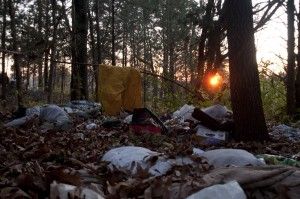Sustainability born through beauty

November 28, 2012
Southern Illinois is known for its wine trail, lakes and forests.
It’s also known for the cigarette butts, plastic bags, and empty beer and soda cans that dot its landscape.
While some people feel free to toss their trash out their car windows, groups in Carbondale are working to undo the damge they cause.
Advertisement
They say littering not only affects the area’s tourism but also contaminates the water supply, harms wildlife and costs money to clean up.
Sarah Heyer, executive director of Keep Carbondale Beautiful, said it’s even more important to keep trash off the ground in a town with as much nature as Carbondale.
She said cigarette butts make up about 30 percent of the discarded items she collects with the group.
The butts can cause health problems for people and wildlife alike, she said.
According to cigarettelitter.org, a website dedicated to reducing cigarette litter nationwide, many people who discard cigarettes do so because they believe they are biodegradable.
Cigarette filters are made of a plastic that can have adverse effects on water quality and the health of fish and other animals when a discarded butt is carried by wind or rain to a water source, according to the website.
Heyer said a small piece of trash can present a big problem if people continue to be careless.
Advertisement*
“(Cigarettes) are one specific thing that people don’t suspect as litter sometimes. … With a cigarette butt, you throw it down, you step on it and you’re done,” she said. ‘But the truth is it’s toxic.”
Rebecca Filippini, president of Beautify Southern Illinois, said in an email her group has encountered many non-biodegradable items such as chip bags and soda cans, which can also slowly harm the environment if not disposed of properly.
“Most trash, like chip bags and cigarette butts, are composed of different chemical compounds,” she said. “If they are not disposed of the right way, those chemicals can be leached into the environment, creating diseases for nearby organisms and destroying the soil quality.”
Heyer said while litter is a problem in many communities, Carbondale faces the extra challenge of being a college town with so many temporary residents.
She said a large number of the city homes are rented, which might explain the prevalence of litter around town.
“It’s just that many people are transient if you consider that Carbondale is 70-some percent rental,” she said. “So then people are less likely to feel a commitment to the place, to the earth, to the land. In smaller towns, where people have lived there all their lives, they feel more of a connection to the place.”
However, Heyer said groups on and off campus work to fix the problems caused by people who toss trash where it doesn’t belong.
Keep Carbondale Beautiful runs an “adopt-a-spot” program in which any person or group can claim a half- or full-mile stretch of land to clean monthly, she said. Some of the program’s participants include Sigma Chi, Alpha Gamma Rho, Delta Zeta and the Panhellenic Association.
Although the programs have seen many contributors, both groups are looking for more volunteers and donations. Interested applicants can apply to volunteer or donate at their websites, beautifysouthernillinois.org and keepcb.org.
Paul Restivo, director of the university’s Center for Environmental Health and Safety and the adviser to Beautify Southern Illinois, said in an email students who log 30 hours of volunteer service during an academic year will earn an SIU Environmental Ambassador Award.
Heyer said people should be responsible for themselves and the space they live in for everyone’s sake.
“We should all feel a little responsible for our environment and maintaining it in a way we want it to be,” she said.
Advertisement







